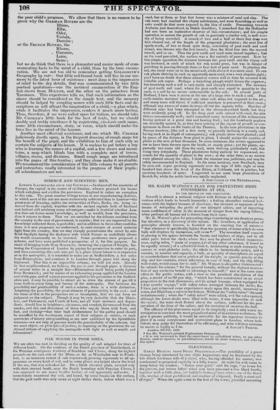SCIENCE AND SCIENTIFIC MEN. .
LONDON ILLUMINATED FROM THE COUNTRY.—Illahnost all the countries of Europe, the capital is the centre of civilization, whence proceed the beams which enlighten and civilize the provinces. England is rather an exception to this rule. The great number of large towns in our manufacturing districts, in which most of the arts are more extensively cultivated than in London—the greatseats of learning, unlike the universities of Paris, Berlin, etc. being re- moved from the capital, together with the ancient capitals both of Scotland and Ireland still retaining many advantages—make it doubtful whether Lon- don does not derive more knowledge, as well as wealth, from the provinces, than it returns to them. That we are enriched by the tributes remitted from the country to the seat of government, is certain ; that we are improved by the knowledge collected there, is probable; and in addition to these other contribu- tions, it is now proposed: we understand, to send streams of actual material light from the country, that we may cheaply perambulate the street by arti- ficial day-light during the darkness with which Nature so unskilfully allows the world occasionally to be invested. Some gentlemen have proposed a scheme, and have even published a prospectus of it, for this purpose. In- stead of bringing coals from Newcastle, incurring the expense of freight, fat- tening the Corporation of London by paying for permission to enter its port, and then converting the coals into gas in a place where labour is so expensive as in the metropolis, it is intended to make gas at Staffordshire, a few miles from Birmingham, and conduct it to London through pipes laid along the high-road. That this is an impossible scheme, we will not aver. Already in that neighbourhood, we believe, the gas is sent through pipes a distance of several miles in a straight line—Birmingham itself being partly lighted from Bromwich ; and by means of an exhausting pump applied at the London end of the pipe, and of a great pressure applied to the gasometer at the Stafford- shire end, it may he possible to attract air to drive the stream of gas till it issue forth in every lamp and burner of the metropolis. But between the possibility and practicability of such a scheme, there is a wide distinction. Admitting the possibility, the great element of practicability is the cost and the items of that in the prospectus are so incomplete, that we can form no judgment on the subject. Though it may be very desirable that the Minis- ters, and Parliament, and Courts of Law, and all their retainers and depen- dants, should live in brightness, cleanness, and comfort, far removed from the smoke, and dirt, and discontent of those who sup2ly them with food, and fuel, and clothing--that their high deliberations for the public good should be unruffled by the wo-begone aspect of their subjects or suitors, or such spectacles of misery and grumbling as are now exhibited by the Spitalfields weavers—we not only at present doubt the practicability of the scheme, but we must object, on principles of justice,' to imposing on the provinces the ad- ditional tribute of supplying the metropolis with light as well as wealth and information !


















 Previous page
Previous page